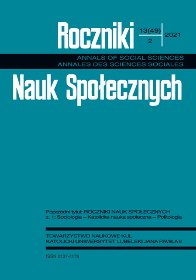Protecting the American Way of Life as a Value in the US Cybersecurity Strategy
Abstract
The National Cybersecurity Strategy of the United States of America, issued in 2018 by the Donald Trump administration, indicated as the first pillar, among others, preserving the American way of life. The article aims to present the American way of life as a value that binds Americans, becomes symbols of America and at the same time is one of the political slogans of the Republican party. The American way of life consists of a number of features, including human rights and fundamental freedoms, including freedom of speech, freedom of assembly and association are legally protected, including in cyberspace. According to Trump, the development of the Internet has made one of the greatest advances since the industrial revolution, enabling great advances in trade, healthcare, communications and every element of the national infrastructure, and the United States aims to uphold the principles of protecting and promoting open, interoperable, reliable and secure Internet.
References
Barry J.M. (2012), God, government and Roger Williams’ big idea, Smithsonian Magazine, January, https://www.smithsonianmag.com/history/god-government-and-roger-williams-big-idea-6291280/
Dobrzeniecki K. (2004), Prawo a etos cyberprzestrzeni, Toruń: Wydawnictwo Adam Marszałek.
Herberg W. (1955), Protestant-Catholic-Jew: An essay in American religious sociology, New York: Chicago University Chicago Press.
Karp L.N. (2010), Truth, justice, and the American way: What Superman teaches us about the American dream and changing values within the United States, https://ir.library.oregonstate.edu/downloads/bg257k105
Kearny Datesman M., Crandall J., Kearny E.N. (2014), American ways: An introduction to American culture, White Plains, NY: Pearson Education.
Klingenstein T.D. (2020), Preserving the American way of life, The American Mind. A publication of the Claremont Institute, https://americanmind.org/features/preserving-the-american-way-of-life/ [dostęp 28.12.2020].
Kordela M. (2006), Zasady prawa jako normatywna postać wartości, Ruch Prawniczy, Ekonomiczny i Socjologiczny, nr 68(1), s. 39-54.
Kordela M. (2016), Aksjologia źródeł prawa, Ruch Prawniczy, Ekonomiczny i Socjologiczny, nr 78(2), s. 15-26.
Lilli, E. (2020), President Obama and US cyber security policy, Journal of Cyber Policy, nr 5(1), s. 1-20.
Michałowska K. (2017), Niemajątkowe wartości życia rodzinnego w prawie cywilnym, Warszawa: C.H. Beck.
Mickiewicz P. (2017), System bezpieczeństwa cybernetycznego państw europejskich. Analiza porównawcza, Rocznik Bezpieczeństwa Międzynarodowego, nr 11(1), s. 65-80.
Puzynina J. (2014), Kłopoty z nazwami wartości (i wartościami), Etnolingwistyka. Problemy Języka i Kultury, nr 26, s. 7-20.
Reeves R. (2009), What is American way of life?, May 13, https://www.realclearpolitics.com/ articles/2009/05/13/what_is_the_american_way_of_life_96463.html [dostęp: 28.12.2020].
Rodewald M. (2009), Indywidualizm amerykański na tle innych społeczeństw zachodnich, Język. Komunikacja. Informacja, nr 4, s. 95-108.
Samuel L.R. (2017), American way of life. A cultural history, Lanham, MD: Fairleigh Dickinson University Press.
Sarnecki P. (2013), Ustroje konstytucyjne państw współczesnych, Warszawa: Wolters Kluwer business.
Stahl R.Y. (2015), A Jewish America and a Protestant civil religion: Will Herberg, Robert Bellah, and mid-twentieth century American religion, Religions, nr 6(2), s. 434-450, https://www.mdpi.com/2077-1444/6/2/434/htm [dostęp: 28.12.2020].
Subocz A. (2009), Wartości zawarte w Deklaracji Niepodległości i jej twórcy w przemówieniach inauguracyjnych prezydentów Stanów Zjednoczonych w latach 1941-2001, Białostockie Teki Historyczne, nr 7, s. 121-137.
Wall, W.L. (2008), Inventing the ‘American way’: The politics of consensus from the new deal to the civil rights movement, New York: Oxford University Press.
Worona J. (2020), Cyberprzestrzeń a prawo międzynarodowe. Status quo i perspektywy, Warszawa: Wolters Kluwer.
Zachariasz A.L. (1995), Wartości: geneza, pojęcia, ich status i funkcje, Folia Philosophica, nr 13, s. 101-121.
Zajko M. (2015), Canada’s cyber security and the changing threat landscape, Critical Studies on Security, nr 3(2), s. 147-161.
Żuk G. (2016), Edukacja aksjologiczna. Zarys problematyki, Lublin: Wydawnictwo UMCS.
Copyright (c) 2021 Roczniki Nauk Społecznych

This work is licensed under a Creative Commons Attribution-NonCommercial-NoDerivatives 4.0 International License.


